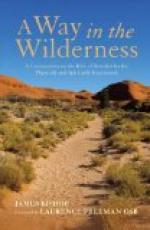There was another loon, a mother bird, on a different lake, whose two eggs had been carried off by a thieving muskrat; but she did not know who did it, for Musquash knows how to roll the eggs into water and carry them off, before eating, where the mother bird will not find the shells. She came swimming down to meet us the moment our canoe entered the lake; and what she seemed to cry was, “Where are they? O where are they?” She followed us across the lake, accusing us of robbery, and asking the same question over and over.
But whatever the meaning of Hukweem’s crying, it seems to constitute a large part of his existence. Indeed, it is as a cry that he is chiefly known—the wild, unearthly cry of the wilderness night. His education for this begins very early. Once I was exploring the grassy shores of a wild lake when a mother loon appeared suddenly, out in the middle, with a great splashing and crying. I paddled out to see what was the matter. She withdrew with a great effort, apparently, as I approached, still crying loudly and beating the water with her wings. “Oho,” I said, “you have a nest in there somewhere, and now you are trying to get me away from it.” This was the only time I have ever known a loon to try that old mother bird’s trick. Generally they slip off the nest while the canoe is yet half a mile away, and swim under water a long distance, and watch you silently from the other side of the lake.
I went back and hunted awhile for the nest among the bogs of a little bay; then left the search to investigate a strange call that sounded continuously farther up the shore. It came from some hidden spot in the tall grass, an eager little whistling cry, reminding me somehow of a nest of young fish-hawks.
As I waded cautiously among the bogs, trying to locate the sound, I came suddenly upon the loon’s nest—just the bare top of a bog, where the mother bird had pulled up the grass and hollowed the earth enough to keep the eggs from rolling out. They were there on the bare ground, two very large olive eggs with dark blotches. I left them undisturbed and went on to investigate the crying, which had stopped a moment as I approached the nest.




